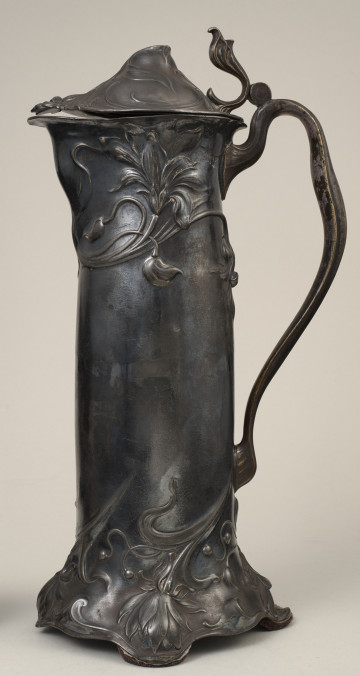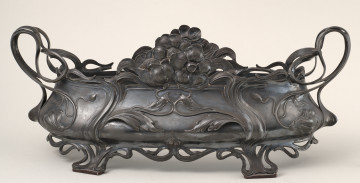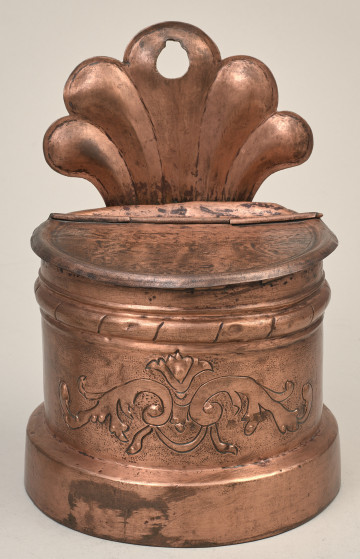
Pot
20th century
Castle Museum in Łańcut
Part of the collection: Metale
Pot This art nouveau pot from the collection of the museum was made of silver-coated copper; it is patinated and stems from the year 1900. It has the shape of a tall cylinder, slightly extended at the bottom and top, transforming into a square base with a wavy edge at the bottom, with the rounded corners creating feet; at the top, it has a spout. It is covered with a conical top, mounted on a decorative hinge shaped as a leaf, connecting to a fancifully swinging holder in the shape of a twig, ending at the bottom with a leaf. The pitcher’s lower area and upper area, together with the cover, are decorated with a low relief of twisting, leafy branches and flowers, akin to lilies. The interior of the pot is silver-coated, without patina. It is presently displayed alongside another identical pot and jardiniere in room no. 58 on the 2nd floor. The Polish designation of the style – secession – stems from the Latin word secessio – meaning „to separate”. Secession, or art nouveau, thrived in the plastic arts of Europe at the end of the 19th and the beginning of the 20th centuries. The main properties of the style were the introduction of twisting lines, rich ornamentation, mainly referring to flora and fauna. This characteristic meandering, smooth line was, according to most scholars, taken by artists from the world of nature. The new style found a place for itself in painting, sculpture, through architecture, furniture, all the way to jewellery, fashion or fabrics. After a period of domination in art, it was already considered a sign of bad taste in the 1920s-1930s. As time passed, thanks to statements by artists such as Salvador Dali, exhibitions and publication, interest arose again.
Author / creator
Dimensions
height: 34.7 cm, width: 18 cm
Object type
Metals
Technique
tin coating
Material
tin
Creation time / dating
Creation / finding place
Owner
Castle Museum in Łańcut
Identification number
Location / status

20th century
Castle Museum in Łańcut

20th century
Castle Museum in Łańcut

18th century
Castle Museum in Łańcut
DISCOVER this TOPIC
National Museum in Szczecin
DISCOVER this PATH
Educational path